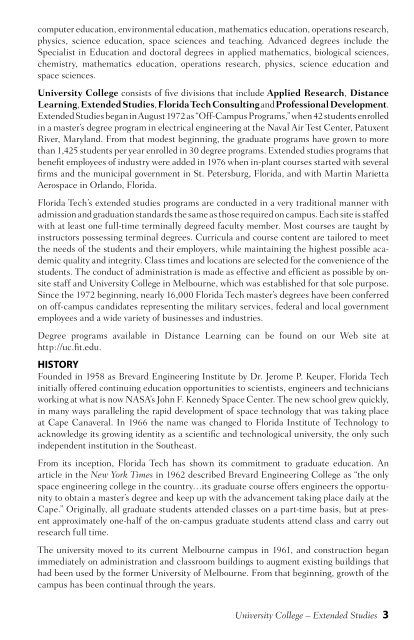university college - Department of Extended Studies - Florida ...
university college - Department of Extended Studies - Florida ...
university college - Department of Extended Studies - Florida ...
You also want an ePaper? Increase the reach of your titles
YUMPU automatically turns print PDFs into web optimized ePapers that Google loves.
computer education, environmental education, mathematics education, operations research,<br />
physics, science education, space sciences and teaching. Advanced degrees include the<br />
Specialist in Education and doctoral degrees in applied mathematics, biological sciences,<br />
chemistry, mathematics education, operations research, physics, science education and<br />
space sciences.<br />
University College consists <strong>of</strong> five divisions that include Applied Research, Distance<br />
Learning, <strong>Extended</strong> <strong>Studies</strong>, <strong>Florida</strong> Tech Consulting and Pr<strong>of</strong>essional Development.<br />
<strong>Extended</strong> <strong>Studies</strong> began in August 1972 as “Off-Campus Programs,” when 42 students enrolled<br />
in a master’s degree program in electrical engineering at the Naval Air Test Center, Patuxent<br />
River, Maryland. From that modest beginning, the graduate programs have grown to more<br />
than 1,425 students per year enrolled in 30 degree programs. <strong>Extended</strong> studies programs that<br />
benefit employees <strong>of</strong> industry were added in 1976 when in-plant courses started with several<br />
firms and the municipal government in St. Petersburg, <strong>Florida</strong>, and with Martin Marietta<br />
Aerospace in Orlando, <strong>Florida</strong>.<br />
<strong>Florida</strong> Tech’s extended studies programs are conducted in a very traditional manner with<br />
admission and graduation standards the same as those required on campus. Each site is staffed<br />
with at least one full-time terminally degreed faculty member. Most courses are taught by<br />
instructors possessing terminal degrees. Curricula and course content are tailored to meet<br />
the needs <strong>of</strong> the students and their employers, while maintaining the highest possible academic<br />
quality and integrity. Class times and locations are selected for the convenience <strong>of</strong> the<br />
students. The conduct <strong>of</strong> administration is made as effective and efficient as possible by onsite<br />
staff and University College in Melbourne, which was established for that sole purpose.<br />
Since the 1972 beginning, nearly 16,000 <strong>Florida</strong> Tech master’s degrees have been conferred<br />
on <strong>of</strong>f-campus candidates representing the military services, federal and local government<br />
employees and a wide variety <strong>of</strong> businesses and industries.<br />
Degree programs available in Distance Learning can be found on our Web site at<br />
http://uc.fit.edu.<br />
HISTORY<br />
Founded in 1958 as Brevard Engineering Institute by Dr. Jerome P. Keuper, <strong>Florida</strong> Tech<br />
initially <strong>of</strong>fered continuing education opportunities to scientists, engineers and technicians<br />
working at what is now NASA’s John F. Kennedy Space Center. The new school grew quickly,<br />
in many ways paralleling the rapid development <strong>of</strong> space technology that was taking place<br />
at Cape Canaveral. In 1966 the name was changed to <strong>Florida</strong> Institute <strong>of</strong> Technology to<br />
acknowledge its growing identity as a scientific and technological <strong>university</strong>, the only such<br />
independent institution in the Southeast.<br />
From its inception, <strong>Florida</strong> Tech has shown its commitment to graduate education. An<br />
article in the New York Times in 1962 described Brevard Engineering College as “the only<br />
space engineering <strong>college</strong> in the country…its graduate course <strong>of</strong>fers engineers the opportunity<br />
to obtain a master’s degree and keep up with the advancement taking place daily at the<br />
Cape.” Originally, all graduate students attended classes on a part-time basis, but at present<br />
approximately one-half <strong>of</strong> the on-campus graduate students attend class and carry out<br />
research full time.<br />
The <strong>university</strong> moved to its current Melbourne campus in 1961, and construction began<br />
immediately on administration and classroom buildings to augment existing buildings that<br />
had been used by the former University <strong>of</strong> Melbourne. From that beginning, growth <strong>of</strong> the<br />
campus has been continual through the years.<br />
University College – <strong>Extended</strong> <strong>Studies</strong> 3


